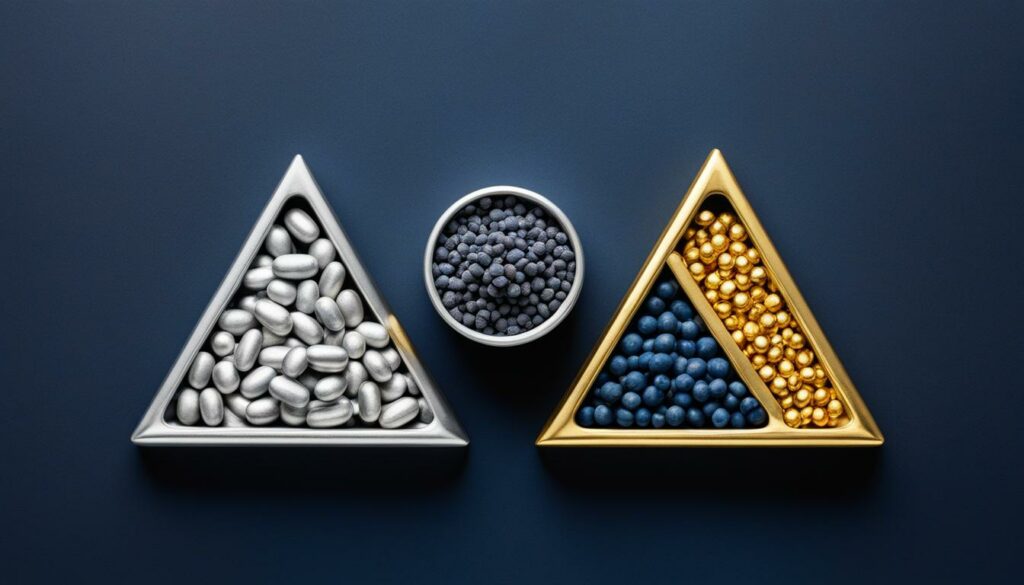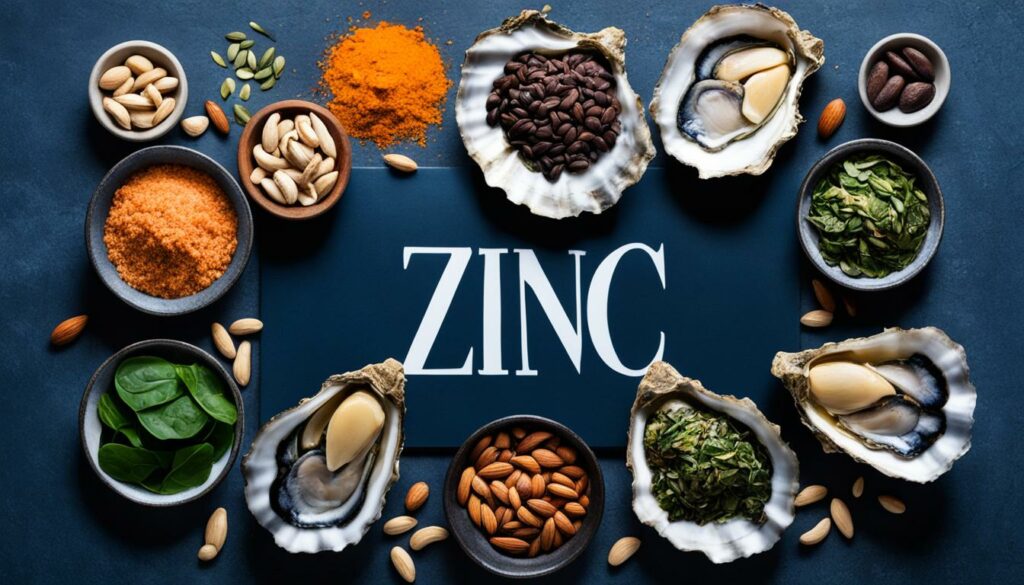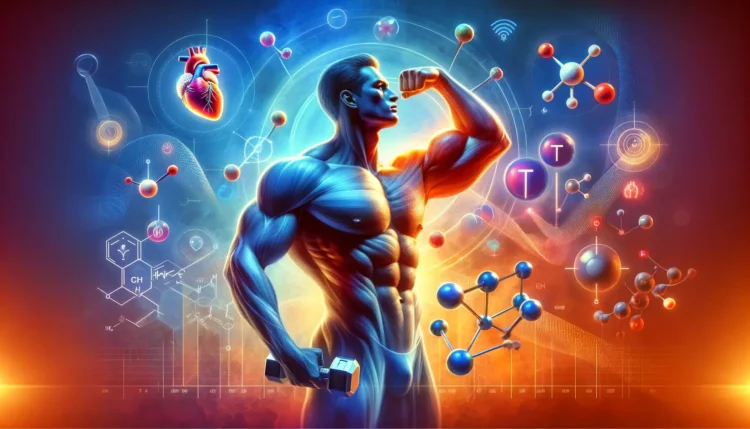Testosterone is a vital hormone for men’s overall health and fitness. Low testosterone levels can lead to decreased physical strength, sluggishness, and various health issues.
Fortunately, there is a natural way to increase testosterone production. A combination of Zinc, Magnesium, and Vitamin B6 can synergistically enhance testosterone levels and overall sexual health.
Key Takeaways:
- Zinc, Magnesium, and Vitamin B6 work together to promote testosterone production and support overall sexual health.
- Each nutrient has individual benefits that support hormone synthesis and regulate testosterone levels in the body.
- Zinc, Magnesium, and Vitamin B6 aid in reducing muscle soreness, enhancing repair processes, and promoting faster recovery after intense workouts.
- Common sources of Zinc, Magnesium, and Vitamin B6 in the diet and potential deficiencies that can occur.
- The recommended dosage of Zinc, Magnesium, and Vitamin B6 for maximizing testosterone levels and potential side effects associated with excessive intake of these nutrients.
The Importance of Zinc, Magnesium, and Vitamin B6 for Testosterone Production
Zinc, Magnesium, and Vitamin B6 are three essential nutrients that play a significant role in testosterone production and overall sexual health. The combination of these nutrients can synergistically enhance testosterone levels, resulting in increased libido, muscle growth, and improved athletic performance.
Zinc is crucial in supporting the production of testosterone. It helps regulate the levels of luteinizing hormone (LH), which stimulates testosterone production in the testicles. Zinc also plays a vital role in semen and sperm production, making it essential for male fertility.
Magnesium is another critical nutrient that supports testosterone production. It helps regulate levels of sex hormone-binding globulin (SHBG), which binds to testosterone and reduces its availability in the body.
By maintaining healthy levels of SHBG, magnesium increases testosterone availability and supports optimal hormonal balance.
Vitamin B6 is also essential for testosterone production. It supports the metabolism of androgens in the body, including testosterone, helping to regulate hormonal balance. Vitamin B6 deficiency can lead to decreased testosterone levels and may impact male fertility.
Together, Zinc, Magnesium, and Vitamin B6 form a powerful combination that can support testosterone production and overall sexual health. By incorporating these nutrients into your diet, you can optimize hormonal balance and promote your well-being.
The Benefits of Zinc, Magnesium, and Vitamin B6 for Testosterone Production:
| Nutrient | Benefits | Food Sources |
|---|---|---|
| Zinc | Increased testosterone production, improved sperm production and motility, enhanced sexual function | Oysters, beef, pumpkin seeds, chickpeas, cashews |
| Magnesium | Improved testosterone availability, enhanced muscle function, reduced inflammation, improved recovery after exercise | Spinach, almonds, legumes, whole grains, avocado |
| Vitamin B6 | Regulated hormonal balance, enhanced androgen metabolism, improved cognitive function | Tuna, salmon, chicken, bananas, potatoes |
“Zinc, Magnesium, and Vitamin B6 are three essential nutrients that play a significant role in testosterone production and overall sexual health.”
By incorporating rich sources of Zinc, Magnesium, and Vitamin B6 into your diet or taking a daily supplement, you can support your well-being by promoting healthy testosterone levels, improved muscle function, and enhanced cognitive function.
The Link Between Zinc, Magnesium, and Vitamin B6 and Muscle Recovery
If you are an athlete or regularly engage in physical activity, muscle recovery is crucial for maintaining peak performance. The combination of Zinc, Magnesium, and Vitamin B6 can play a significant role in your body’s recovery process.
Zinc aids in reducing inflammation and oxidative stress, both of which are common after intense workouts. Magnesium helps to relax muscles by reducing muscle spasms and cramping, while Vitamin B6 assists in protein synthesis, essential for building and repairing muscle tissue.
In addition to reducing muscle soreness, these nutrients enhance repair processes, stimulate growth and retention of muscles necessary for preventing future injuries. By promoting faster recovery times, these minerals optimize muscle function for a more significant impact in your performance.

“Given their crucial roles in muscle recovery, Zinc, Magnesium, and Vitamin B6 are essential nutrients for athletes and individuals who engage in regular exercise.”
Sources and Deficiency of Zinc, Magnesium, and Vitamin B6
Zinc, magnesium, and vitamin B6 are vital nutrients for testosterone production and overall sexual health. However, deficiencies in these nutrients are not uncommon and can impact hormonal balance. It is important to consume foods containing these nutrients regularly to avoid deficiencies that may affect testosterone levels.
Sources of Zinc
One of the best sources of zinc is oysters, which contain high amounts of this nutrient per serving. Other sources of zinc include:
- Red meat
- Poultry
- Shellfish
- Legumes
- Nuts and seeds

Sources of Magnesium
Magnesium can be found in a variety of foods, including:
- Dark leafy greens such as spinach and kale
- Nuts and seeds
- Whole grains
- Legumes
- Fish
Sources of Vitamin B6
Vitamin B6 is abundant in many foods, including:
- Poultry and meat
- Fish
- Whole grains
- Legumes
- Leafy green vegetables
A deficiency in any of these nutrients can impact testosterone levels and overall health.
Low levels of zinc magnesium and vitamin B6 have been linked to decreased testosterone production, poor muscle function, and low energy levels. It is essential to have a balanced diet rich in these nutrients for optimal sexual health and fitness.
Optimal Dosage of Zinc, Magnesium, and Vitamin B6 for Testosterone Boost
Now that we’ve covered the benefits of Zinc, Magnesium, and Vitamin B6 for testosterone production and muscle recovery, let’s explore the optimal dosage of these nutrients for boosting testosterone levels.
Studies have shown that the recommended daily dosage for Zinc is between 11-40mg, while for Magnesium, it ranges from 200-400mg, and for Vitamin B6, it is between 1.2-2.0mg. However, the ideal dosage range for testosterone optimization may vary depending on age, gender, and individual hormonal imbalances.
It is important to note that excessive intake of these nutrients can lead to potential side effects such as digestive discomfort, nausea, and headaches. Thus, it’s essential to consult with a healthcare professional before supplementing with Zinc, Magnesium, and Vitamin B6.
Overall, Zinc, Magnesium, and Vitamin B6 provide a powerful combination of nutrients that can synergistically enhance testosterone levels and overall sexual health. By taking the recommended dosage range and addressing potential deficiencies, you can optimize hormonal balance and support your fitness goals.
Conclusion
Zinc, Magnesium, and Vitamin B6 offer a powerful blend for boosting testosterone levels and promoting overall sexual health. These nutrients work together to optimize hormonal balance, support muscle recovery after intense workouts, and aid in reducing muscle soreness.
It is essential to incorporate these nutrients into your diet to avoid potential deficiencies that may impact testosterone levels. You can find Zinc, Magnesium, and Vitamin B6 in common food sources such as meat, poultry, beans, nuts, and leafy greens.
Although the recommended dosage of Zinc, Magnesium, and Vitamin B6 varies based on individual needs, daily intake in adequate amounts is generally safe and can offer significant benefits. However, excessive intake of these nutrients may lead to adverse side effects.
Therefore, it is crucial to consult with a healthcare professional before taking any supplements and determine the optimal dosage for your needs.
In conclusion, Zinc, Magnesium, and Vitamin B6 are essential nutrients that can synergistically enhance testosterone levels and overall sexual health. By understanding the benefits and sources of these nutrients and incorporating them into your daily routine, you can optimize your hormonal balance and support your fitness goals.
FAQ
What are the benefits of Zinc, Magnesium, and Vitamin B6 for testosterone production?
Zinc, Magnesium, and Vitamin B6 play crucial roles in testosterone production. Zinc is involved in testosterone synthesis, while Magnesium helps to increase free testosterone levels. Vitamin B6 supports hormone regulation, ensuring optimal testosterone production.
How do Zinc, Magnesium, and Vitamin B6 enhance muscle recovery?
Zinc, Magnesium, and Vitamin B6 aid in muscle recovery by reducing muscle soreness, promoting repair processes, and enhancing post-workout recovery. These nutrients support muscle tissue repair and assist in the growth and development of healthy muscles.
What are the sources of Zinc, Magnesium, and Vitamin B6?
Good sources of Zinc include seafood, meat, nuts, and seeds. Magnesium can be found in green leafy vegetables, nuts, whole grains, and legumes. Vitamin B6 is commonly found in poultry, fish, bananas, and potatoes.
What happens if I have a deficiency of Zinc, Magnesium, or Vitamin B6?
Deficiency of Zinc, Magnesium, or Vitamin B6 can lead to hormonal imbalances and impact testosterone production. Symptoms of Zinc deficiency include weakened immune function, hair loss, and lowered testosterone levels.
Magnesium deficiency can result in muscle cramps, low energy levels, and reduced testosterone. Vitamin B6 deficiency can lead to mood swings, fatigue, and decreased testosterone production.
What is the optimal dosage of Zinc, Magnesium, and Vitamin B6 for testosterone boost?
The recommended daily dosage of Zinc is 11 mg for men. For Magnesium, the recommended daily intake is around 400-420 mg for men. Vitamin B6 has a recommended daily allowance of 1.3-1.7 mg for adults.
However, it is always beneficial to consult with a healthcare professional to determine the appropriate dosage for your specific needs.




